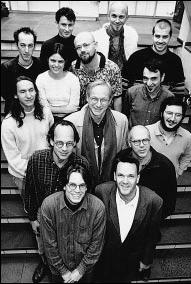
[an error occurred while processing this directive]
The Logic in Action Projects: An Overview

The main activities of the Logic in Action project are clustered in three overlapping groups, which are allocated to three, mutually related, subprojects.
Logic in Communication sits at the interdisciplinary interface between humanities and exact sciences, aiming to contribute to further `alpha-beta-ization' of the university. In this subproject, dynamic, modal and epistemic logics are applied in the study and formal modeling of information and its flow, with an eye on characterizing the properties and structures essentially required for successful processing, in natural as well as artificial contexts. A large part of the group's research is performed within a framework of modal logic and related formalisms like dynamic logic, or the guarded fragment of the predicate calculus. Modal logic is pleasantly robust in its balance between expressive power and computational simplicity, while retaining a nice metalogic.
There is also a more practical strand running through the Spinoza project. Computational Logic is a pilot project for making computational concerns and facilities an essential part of our research efforts. Thus, the project's name is taken quite literally. The group's ideas are put to work in actually implemented systems. One particular effort is the construction of effective theorem provers and model checkers for formalisms like modal logic or the guarded fragment of first order logic, thus making the nice computational behavior of such systems very concrete. Another is the development of tools for reasoning about complex domains with pluriform and underspecified information. All this material is made publicly available on the Internet.
Dissemination of Logic is a kernel project for translating the group's research efforts into insights and tools for a larger community. Since logic has an important part to play in the information sciences, we believe that it deserves a place in broader curricula, and in the minds of the general educated public. While this is a task for the logic community at large, we are undertaking several pilot actions of this kind, including university course innovation, electronic long-distance teaching, and research on interactive documents, both using and spreading our ideas on information flow.
Besides the three subprojects, the overall project has a `free space', devoted to stimulating general events and encouraging new individual initiatives. Part of its resources are allocated to regular items, such as the Spinoza lecture at the European Summer School on Logic, Language and Information, or the annual European prize for the best dissertation in pure and applied logic. But for another part we will continue to look for new opportunities for broader communication. `The unknown' deserves a hearing!
Logic and action constitute the backbones of all activities undertaken in the Logic in Action project, theoretically (research, formal modeling) as well as practically (computation and implementation, education and dissemination). As, we hope, the following report on the project's activities in 1999 shows, the project is the natural habitat for logicians who initiate activities.